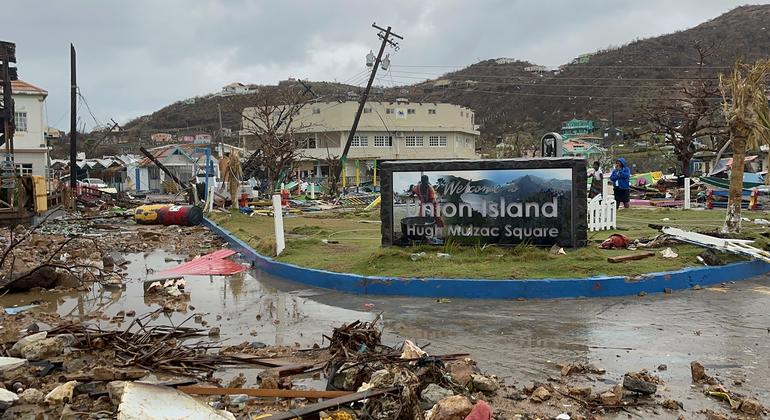UN stresses gender-sensitive approach to responding to Hurricane Beryl

The response planThe initial need estimate, announced Tuesday, is $9 million and aims to assist approximately 43,000 people in Grenada and Saint Vincent and the Grenadines. These estimates are subject to change as detailed assessments are conducted.
The plan aims to provide multi-sectoral support to save lives, complementing Government-led efforts, while ensuring the protection of women, girls and other vulnerable groups from gender-based violence.
It will also support the rapid delivery and restoration of essential services and livelihoods in affected areas, including the restoration of health, water and sanitation, education and agriculture services.
Gender sensitivity is important.
The plan emphasizes that gender sensitivity will be important in analyzing needs and
response, as both countries have significant proportions of female-headed households.
Nearly half of households in Grenada and 39 percent in Saint Vincent and the Grenadines are headed by women.
The region is also prone to high levels of violence against women and girls, with nearly 39 percent of women in Grenada experiencing violence in a relationship.
Reaction stages
The initial humanitarian response is expected to take place in two main phases that may overlap in practice, depending on the situation on the ground. This approach will ensure that immediate needs are met while laying the foundations for long-term recovery.
In the coming period, humanitarian organizations will act quickly to expand the scope and scale of aid efforts, including rapid assessments, scaling up supplies, restoring critical sectors such as health care, water and sanitation, and addressing protection risks.
The focus will then shift to helping people get on with their lives. This phase will include recovery and reconstruction, restoring livelihoods, building resilience and moving to longer-term activities.
International solidarity
To kickstart the response, the UN Secretary-General last week allocated $4 million from Organization Central Emergency Response Fund (CERF), including $1.5 million for Grenada and Saint Vincent and the Grenadines.
According to the United Nations Office for the Coordination of Humanitarian Affairs (OCHA), Canada has announced $1 million in aid, which will be channeled through UN agencies and the Red Cross. It is also supporting the Caribbean Disaster Emergency Management Agency (CDEMA).
OCHA also urges individual donors to make financial contributions to reputable charities or aid agencies and to avoid in-kind contributions, which may not address identified needs or meet required quality standards, potentially creating administrative burdens and undermining local markets.
Donations can also be made to CERF, OCHA-UNDP Business Connectivity Initiative (CBi), or by supporting advocacy and public outreach. Support or donations provided can be reported online to Financial Tracking Service to ensure consistency and minimize duplication.

A family stands outside their home destroyed by Hurricane Beryl in St. Andrews, Grenada.
Strongest storm ever in June
Hurricane Beryl is strongest storm historically formed in June in the Atlantic Ocean.
Initially a tropical depression, it rapidly intensified into a Category 4 storm and briefly reached Category 5, with winds of up to 240 km/h (150 mph).
World Meteorological Organization of the United Nations (World Meteorological Organization) experts have warning of “very severe” storm season This year, with near-record ocean temperatures and a shift to La Niña conditions.
The agency predicts as many as 25 named storms will occur in November, of which eight to 13 could develop into hurricanes.




